英国文化与中国文化对比(英文)教学总结
- 格式:doc
- 大小:32.50 KB
- 文档页数:11

中西方文化差异与英语教学摘要:由于历史文化、风俗习惯、生存环境、宗教信仰等不同,导致了中西方语言存在很大的差异,使得在语言学习和文化交流上出现了许多困扰。
我国英语教学长期以来都着重语言形式的学习,随着我国对外交往与民族接触的日益迫切的需要,英语教学要重视交际能力的培养和随之而来的要求对其所属文化有所了解的呼声越来越高。
语言是文化的载体,学习语言不可避免要接触到与之有关的文化。
通过日常教学使学生了解英语国家的文化背景和社会风貌是现时期英语课必备的一个层面。
关键词:中西文化文化差异语言英语教学一、语言与文化的关系语言是人类特有的交际工具,是由音素、词素、词、短语、句子等音义结合的符号系统。
文化是一个民族创造的物质财富和精神财富的总和。
西方人类学家Douglas Brown认为:文化是生活方式,是人们赖以生存、思维、感知和相互交往的背景,是把一个特定的人类社团“粘合”在一起的“粘合剂”。
从这个定义反映出文化包括语言、信念、思维模式、处事态度、价值观、风俗习惯、宗教信仰等。
语言是文化的基石,文化通过语言文字的形式被传承、传达、记载、反映出来。
语言与文化是密不可分的,没有语言,文化就失去了载体。
没有文化,语言就成了无源之水。
美国人类学家古德诺夫(Ward H.Goodenough)在他所著的《文化人类学与语言学》一书中是这样阐述语言与文化的关系的:“一个社会的语言是该社会的文化的一个方面,语言和文化是部分和整体的关系。
语言作为文化的组成部分,其特殊性表现在:它是学习文化的主要工具,人在学习和运用语言的过程中获得整个文化。
”所以要想真正习得一种语言,必须习得这种语言的特定的社会文化背景知识。
二、中西文化差异对语言学习的影响(一)价值观差异体现在中国两千多年的封建社会历史过程中,儒家思想一直占据着根深蒂固的统治地位,对中国社会产生了极其深远的影响。
中国人向来以儒家的“中庸之道”作为行为的基本准则。
“中”是儒家追求的理想境界,人生处世以儒家思想道德观的“仁、义、礼、智、信”为每个人的行为指南,接人待物,言谈举止要考虑“温、良、恭、俭、让”,以谦虚为荣,以虚心为本,反对过分地显露自己,表现自我。
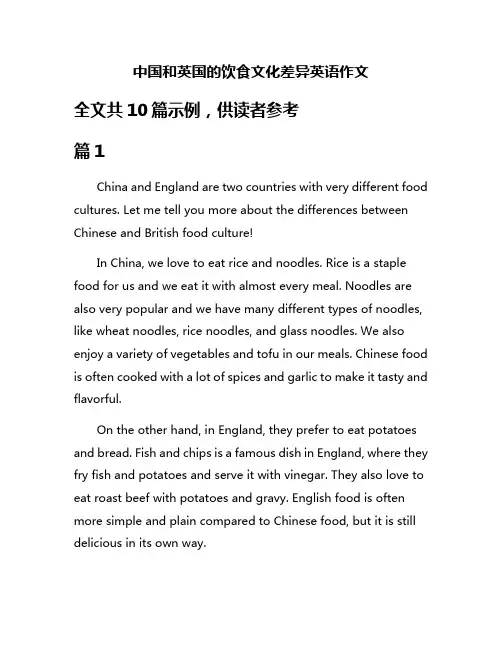
中国和英国的饮食文化差异英语作文全文共10篇示例,供读者参考篇1China and England are two countries with very different food cultures. Let me tell you more about the differences between Chinese and British food culture!In China, we love to eat rice and noodles. Rice is a staple food for us and we eat it with almost every meal. Noodles are also very popular and we have many different types of noodles, like wheat noodles, rice noodles, and glass noodles. We also enjoy a variety of vegetables and tofu in our meals. Chinese food is often cooked with a lot of spices and garlic to make it tasty and flavorful.On the other hand, in England, they prefer to eat potatoes and bread. Fish and chips is a famous dish in England, where they fry fish and potatoes and serve it with vinegar. They also love to eat roast beef with potatoes and gravy. English food is often more simple and plain compared to Chinese food, but it is still delicious in its own way.Another difference is that in China, we like to eat our meals with chopsticks, while in England, they use fork and knife. It can be a bit tricky to use chopsticks at first, but once you get the hang of it, it's really fun!Overall, both Chinese and British food cultures have their own unique flavors and traditions. It's interesting to see how different countries have different ways of preparing and enjoying food. Whether you prefer Chinese noodles or British fish and chips, there's something for everyone to enjoy!篇2China and Britain are two countries with very different food cultures. Let's take a look at some of the differences between Chinese and British food cultures.In China, people eat a lot of rice. Rice is a staple food in China, and it is served with almost every meal. In Britain, on the other hand, people eat a lot of bread. Bread is a staple food in Britain, and it is served with almost every meal.In China, people eat a lot of vegetables. Vegetables are a big part of Chinese cuisine, and they are usually stir-fried or steamed. In Britain, people eat a lot of meat. Meat is a big part of British cuisine, and it is usually roasted or grilled.In China, people eat a lot of noodles. Noodles are a popular dish in China, and they are served in many different ways. In Britain, people eat a lot of potatoes. Potatoes are a popular dish in Britain, and they are served boiled, mashed, or fried.In China, people drink a lot of tea. Tea is a big part of Chinese culture, and it is served with almost every meal. In Britain, people drink a lot of tea too, but they also drink a lot of coffee. Coffee is a big part of British culture, and it is served with almost every meal.Overall, the food cultures of China and Britain are very different. Each country has its own unique dishes and traditions, which make eating in China and Britain a truly special experience.篇3Oh, hi there! Today I'm gonna talk about the differences between Chinese and British food culture. It's gonna be super interesting, trust me!So, in China, food is like super important. We have so many delicious dishes like dumplings, noodles, and rice. We love to eat together with our family and friends, and we always make sure there's enough food for everyone. And we use chopsticks to eat, which is totally cool!But in Britain, they have different food culture. They love their tea and scones, and fish and chips. They also have this thing called a roast dinner, where they eat roast meat like chicken or beef with potatoes and veggies. And they like to have a cup of tea with milk in the afternoon, which is kinda weird but also kinda nice.Another big difference is the way we eat. In China, we like to eat our food hot and fresh, and we use a lot of spices and sauces to make it tasty. But in Britain, they prefer their food more plain and simple, without too many seasonings. They also eat a lot of bread and cheese, which we don't really have in China.Overall, both Chinese and British food cultures are super cool in their own way. It's really interesting to see how different countries have their own unique food traditions. I hope you learned something new today! Thanks for reading, bye!篇4Oh, hi everyone! Today I want to talk about the differences between Chinese and British food culture! It's super interesting, trust me!First of all, let's talk about breakfast. In China, we love to eat congee, fried dough sticks, and steamed buns for breakfast. It'sso yummy! But in the UK, they usually have cereal, toast, and maybe some eggs and bacon. It's quite different, right?Next, let's talk about tea time. In China, we like to have tea and maybe some snacks like dumplings or mooncakes. But in the UK, they have afternoon tea with scones, sandwiches, and cakes. It's so fancy!And for dinner, Chinese people usually eat rice or noodles with veggies and meat. We love to share dishes with our family and friends. But in the UK, they might have roast beef with potatoes and gravy. It's a big meal!Oh, and don't forget about desserts! In China, we have sweet treats like red bean buns and mango pudding. But in the UK, they love their puddings like sticky toffee pudding and apple crumble. It's so tasty!So, you see, there are lots of differences between Chinese and British food culture. But both countries have delicious food that you should try! Maybe you can have a Chinese takeaway one day and then try some traditional British dishes the next. It's a tasty adventure!That's all for now, see you next time! Bye bye!篇5Hello everyone! Today I'm going to talk about the differences between Chinese and British food culture.First of all, let's talk about Chinese food. Chinese people love to eat rice, noodles, and lots of vegetables. We also like to eat a lot of different types of meat, like pork, beef, and chicken. Some popular Chinese dishes include dumplings, fried rice, and hot pot. We also have a tradition of drinking tea with our meals.On the other hand, British food is quite different. British people love to eat things like fish and chips, roast beef with Yorkshire pudding, and bangers and mash. They also love to eat desserts like scones with clotted cream and jam, and sticky toffee pudding. British people often drink tea with milk, or coffee with their meals.Another big difference between Chinese and British food culture is the way meals are served. In China, we usually have a family-style meal, where everyone shares dishes. In Britain, meals are served in courses, starting with a starter, then a main course, and finally dessert.Overall, both Chinese and British food cultures are unique and delicious in their own ways. It's fun to try new foods from different cultures and see how they differ from the food we'reused to. I hope you enjoyed learning about these differences! Thanks for reading!篇6Hey guys! Today, let's talk about the differences between Chinese and British food culture. Are you ready? Let's go!First of all, let's talk about Chinese food. In China, people love to eat rice and noodles. We also eat a lot of vegetables and fruits. Chinese food is very diverse and each region has its own special dishes. Some famous Chinese dishes are dumplings, Kung Pao chicken, and Peking duck. Yum!On the other hand, British food is quite different. In Britain, people eat a lot of meat and potatoes. Some popular British dishes are fish and chips, roast beef, and shepherd's pie. In Britain, people also love to drink tea. Afternoon tea is a very popular tradition in Britain.Another difference between Chinese and British food culture is the way meals are served. In China, meals are servedfamily-style, which means that everyone shares dishes. In Britain, meals are served individually, with each person getting their own plate of food.Overall, Chinese and British food cultures are quite different but both are delicious in their own way. So next time you have the chance, try some Chinese and British food and see which one you like better. Bon appétit!篇7Hey guys! Today, let's talk about the differences between Chinese and British food culture. It's super interesting, so listen up!First of all, let's talk about Chinese food. In China, we love to eat rice, noodles, and dumplings. And oh my goodness, the flavors are out of this world! We have so many different dishes with yummy sauces and spices. Plus, we eat with chopsticks, which is so fun!But in Britain, they love their fish and chips. Can you believe it? They fry fish and potatoes and eat it with vinegar. It's totally different from our food, but I bet it's tasty too. And they use knives and forks to eat, not chopsticks like us.Another big difference is the way we eat together. In China, we love to share dishes with our family and friends. It's all about sharing and caring. But in Britain, everyone has their own plate of food. They don't share like we do.And don't even get me started on dessert! In China, we have sweet buns, rice cakes, and fruit for dessert. But in Britain, they love their puddings like apple crumble and custard. It's so different from what we eat, but I bet it's delicious.Overall, Chinese and British food cultures are so different, but both are amazing in their own way. So let's keep enjoying all the tasty food from around the world!That's all for today, guys. I hope you learned something new about Chinese and British food culture. Bye!篇8China and the UK are two countries with very different food cultures. In China, we love to eat rice, noodles, and dumplings. These are some of our staple foods that we eat almost every day. We also enjoy dishes like Kung Pao chicken, Peking duck, and hot pot. These dishes are full of flavor and very delicious.In the UK, people eat a lot of different foods than we do in China. They love to eat fish and chips, roast beef, and shepherd's pie. They also enjoy desserts like scones, Victoria sponge cake, and trifle. The food in the UK is quite different from what we are used to, but it is still very tasty.One big difference between Chinese and British food culture is the way we eat our meals. In China, we like to eat family-style, where everyone shares dishes from the middle of the table. This creates a sense of community and togetherness. In the UK, people tend to eat their own individual meal without sharing. This can sometimes feel a bit lonely, but it is just a different way of eating.Another difference is the use of spices and seasonings. Chinese food is often very flavorful and spicy, with lots of garlic, ginger, and soy sauce. British food, on the other hand, is more subtle in its flavors, with a focus on herbs like parsley and thyme. Some people in the UK find Chinese food too spicy, while some Chinese people may find British food a bit bland.Overall, both Chinese and British food cultures have their own unique flavors and traditions. It is interesting to learn about the differences and similarities between the two, and to try new foods from different cultures. Food is a big part of our lives, and it is a great way to connect with people from around the world. Let's keep enjoying delicious food together!篇9China and Britain have very different food cultures. Let me tell you about the differences!First of all, in China, we love to eat rice as our staple food. Rice is the most important part of our meals. We also eat a lot of noodles, dumplings, and steamed buns. These foods are delicious and very filling. In Britain, they eat a lot of bread and potatoes. They love to have sandwiches for lunch and potatoes with their meals. They also enjoy fish and chips, which is a popular dish in Britain.Another big difference is the way we eat our meals. In China, we use chopsticks to eat our food. Chopsticks are long, thin sticks that we use to pick up our food. In Britain, they use knives and forks to eat. They cut their food into small pieces and then use their forks to eat. It's very different from how we eat in China!In China, we also have a lot of different types of tea that we drink with our meals. We have green tea, black tea, oolong tea, and many other varieties. In Britain, they drink a lot of black tea with milk and sugar. They also love to have afternoon tea with sandwiches and scones.Overall, China and Britain have very different food cultures. But both countries have delicious and unique dishes that areloved by their people. It's fun to learn about the food traditions of different countries!篇10Chinese and British food cultures are different in many ways. Let's explore these differences and see how they make each country's food unique!In China, we love noodles, dumplings, and rice. Noodles can be found in all shapes and sizes, and we like to slurp them up quickly. Dumplings are stuffed with meat or vegetables and are boiled or fried. They are so yummy! Rice is a staple food in China, and we eat it with almost every meal.On the other hand, in Britain, they love their fish and chips. Fish is usually battered and deep-fried, served with crispy fries. It's a popular dish that you can find at many pubs and restaurants. They also enjoy their pies, like meat pies or shepherd's pies. They are hearty and delicious!Chinese people enjoy tea with their meals, while British people prefer a cup of black tea or coffee. Both countries have their own unique desserts too. In China, we have sweet red bean soup or tangyuan (glutinous rice balls). In Britain, they love their scones with clotted cream and jam, or sticky toffee pudding.Overall, both Chinese and British food cultures have their own specialties and flavors that make them special. It's fun to try new foods from different countries and see how they can be so different yet so delicious! Let's celebrate the diversity in food cultures and enjoy the tasty dishes each country has to offer. Yum yum!。
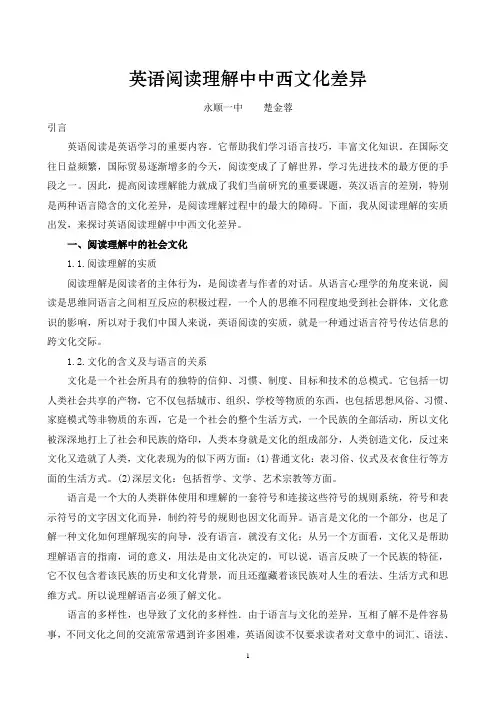
英语阅读理解中中西文化差异永顺一中楚金蓉引言英语阅读是英语学习的重要内容。
它帮助我们学习语言技巧,丰富文化知识。
在国际交往日益频繁,国际贸易逐渐增多的今天,阅读变成了了解世界,学习先进技术的最方便的手段之一。
因此,提高阅读理解能力就成了我们当前研究的重要课题,英汉语言的差别,特别是两种语言隐含的文化差异,是阅读理解过程中的最大的障碍。
下面,我从阅读理解的实质出发,来探讨英语阅读理解中中西文化差异。
一、阅读理解中的社会文化1.1.阅读理解的实质阅读理解是阅读者的主体行为,是阅读者与作者的对话。
从语言心理学的角度来说,阅读是思维同语言之间相互反应的积极过程,一个人的思维不同程度地受到社会群体,文化意识的影响,所以对于我们中国人来说,英语阅读的实质,就是一种通过语言符号传达信息的跨文化交际。
1.2.文化的含义及与语言的关系文化是一个社会所具有的独特的信仰、习惯、制度、目标和技术的总模式。
它包括一切人类社会共享的产物,它不仅包括城市、组织、学校等物质的东西,也包括思想风俗、习惯、家庭模式等非物质的东西,它是一个社会的整个生活方式,一个民族的全部活动,所以文化被深深地打上了社会和民族的烙印,人类本身就是文化的组成部分,人类创造文化,反过来文化又造就了人类,文化表现为的似下两方面:(1)普通文化:表习俗、仪式及衣食住行等方面的生活方式。
(2)深层文化:包括哲学、文学、艺术宗教等方面。
语言是一个大的人类群体使用和理解的一套符号和连接这些符号的规则系统,符号和表示符号的文字因文化而异,制约符号的规则也因文化而异。
语言是文化的一个部分,也足了解一种文化如何理解现实的向导,没有语言,就没有文化;从另一个方面看,文化又是帮助理解语言的指南,词的意义,用法是由文化决定的,可以说,语言反映了一个民族的特征,它不仅包含着该民族的历史和文化背景,而且还蕴藏着该民族对人生的看法、生活方式和思维方式。
所以说理解语言必须了解文化。
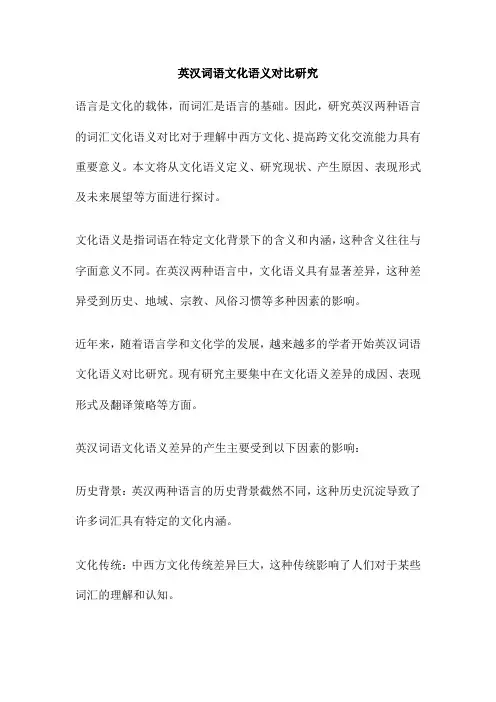
英汉词语文化语义对比研究语言是文化的载体,而词汇是语言的基础。
因此,研究英汉两种语言的词汇文化语义对比对于理解中西方文化、提高跨文化交流能力具有重要意义。
本文将从文化语义定义、研究现状、产生原因、表现形式及未来展望等方面进行探讨。
文化语义是指词语在特定文化背景下的含义和内涵,这种含义往往与字面意义不同。
在英汉两种语言中,文化语义具有显著差异,这种差异受到历史、地域、宗教、风俗习惯等多种因素的影响。
近年来,随着语言学和文化学的发展,越来越多的学者开始英汉词语文化语义对比研究。
现有研究主要集中在文化语义差异的成因、表现形式及翻译策略等方面。
英汉词语文化语义差异的产生主要受到以下因素的影响:历史背景:英汉两种语言的历史背景截然不同,这种历史沉淀导致了许多词汇具有特定的文化内涵。
文化传统:中西方文化传统差异巨大,这种传统影响了人们对于某些词汇的理解和认知。
宗教信仰:不同的宗教信仰对词汇的文化语义产生了重要影响,如英语中的“God”和汉语中的“佛”、“道”等。
英汉词语文化语义差异的表现形式多种多样,以下是几种主要形式:形象意义不同:某些词汇在两种语言中的形象意义存在明显差异,例如“龙”在英语中往往被翻译成“dragon”,而在汉语中则是吉祥、高贵的象征。
情感色彩不同:在两种语言中,某些词汇的情感色彩可能存在差异,例如“dog”在英语中往往被视为忠诚和勇敢的象征,而在汉语中则往往带有贬义。
比喻意义不同:在两种语言中,某些词汇的比喻意义可能存在显著差异,例如“风”在英语中往往被用来比喻爱情和自由,而在汉语中则更多地被用来比喻灾难和困境。
随着全球化的不断深入和跨文化交流的日益频繁,英汉词语文化语义对比研究将越来越受到重视。
未来研究可以从以下几个方面展开:系统性研究:系统地梳理英汉两种语言的文化语义差异,从历史、文化、宗教等多个角度进行分析和比较。
跨学科研究:借鉴其他学科的理论和方法,如认知科学、社会学等,对英汉词语文化语义进行多维度研究。
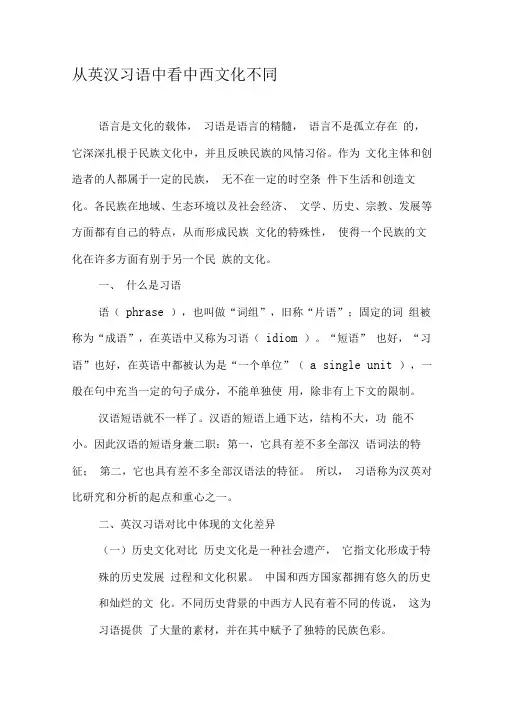
从英汉习语中看中西文化不同语言是文化的载体,习语是语言的精髓,语言不是孤立存在的,它深深扎根于民族文化中,并且反映民族的风情习俗。
作为文化主体和创造者的人都属于一定的民族,无不在一定的时空条件下生活和创造文化。
各民族在地域、生态环境以及社会经济、文学、历史、宗教、发展等方面都有自己的特点,从而形成民族文化的特殊性,使得一个民族的文化在许多方面有别于另一个民族的文化。
一、什么是习语语(phrase ),也叫做“词组”,旧称“片语”;固定的词组被称为“成语”,在英语中又称为习语(idiom )。
“短语” 也好,“习语”也好,在英语中都被认为是“一个单位”(a single unit ),一般在句中充当一定的句子成分,不能单独使用,除非有上下文的限制。
汉语短语就不一样了。
汉语的短语上通下达,结构不大,功能不小。
因此汉语的短语身兼二职:第一,它具有差不多全部汉语词法的特征;第二,它也具有差不多全部汉语法的特征。
所以,习语称为汉英对比研究和分析的起点和重心之一。
二、英汉习语对比中体现的文化差异(一)历史文化对比历史文化是一种社会遗产,它指文化形成于特殊的历史发展过程和文化积累。
中国和西方国家都拥有悠久的历史和灿烂的文化。
不同历史背景的中西方人民有着不同的传说,这为习语提供了大量的素材,并在其中赋予了独特的民族色彩。
中华民族有着两千余年之久的战争历史,因此这也在许多习语中有所体现,而这多来自《史记》,《三国演义》,《水浒传》。
比如“兵不厌诈”“、兵荒马乱”“、知己知彼,百战不殆”等。
这些习语中多含有中国人民耳熟能详的历史故事。
比如,“三个臭皮匠,顶个诸葛亮” 、“东施效颦”、“名落孙山”、“叶公好龙”。
而早期的英国被罗马帝国统治了近四百多年,希腊和罗马文明对英语有着深刻影响。
虽然英国拥有一千多年的历史,却远不如中国的历史悠久,也因此出自历史故事的习语没有汉语的丰富。
但仍有很多目前大家熟知的,而英语典故习语多来自《圣经》和希腊罗马神话,如Achilles 'heel(唯一致命弱点)、meet ones Waterloo (一败涂地)、Pen elopes web (永远完不成的工作)、a Pandoras box (潘多拉之盒;遭灾难、麻烦、祸害的根源)“sour grapes” (聊以自慰),“ nurse a viper in ones bosom” (姑息养奸)。
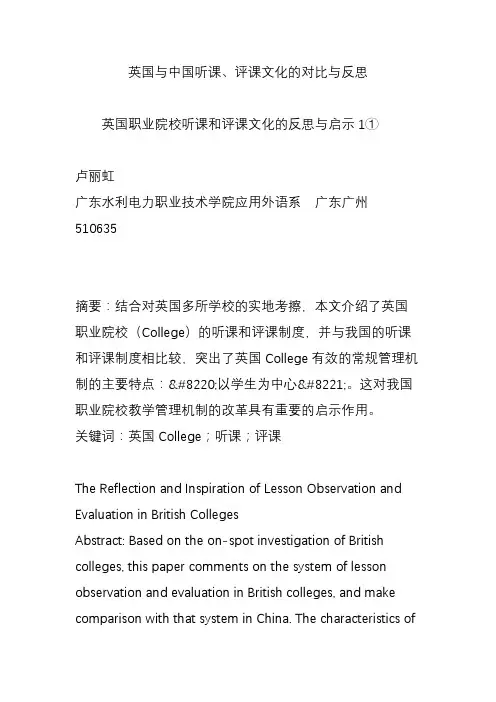
英国与中国听课、评课文化的对比与反思英国职业院校听课和评课文化的反思与启示1①卢丽虹广东水利电力职业技术学院应用外语系广东广州510635摘要:结合对英国多所学校的实地考擦,本文介绍了英国职业院校(College)的听课和评课制度,并与我国的听课和评课制度相比较,突出了英国College有效的常规管理机制的主要特点:“以学生为中心”。
这对我国职业院校教学管理机制的改革具有重要的启示作用。
关键词:英国College;听课;评课The Reflection and Inspiration of Lesson Observation and Evaluation in British CollegesAbstract: Based on the on-spot investigation of British colleges, this paper comments on the system of lesson observation and evaluation in British colleges, and make comparison with that system in China. The characteristicsof effective management in teaching is‘student-centred’ method. It is undoubtedly important enlightenment to the reform of the teaching management in Chinese vocational colleges.Key words: British colleges; lesson observation ; lesson evaluation听课与评课是学校教学常规中的一项重要内容,是对教师课堂教学情况的评价、反馈、探讨和交流,是促进教师成长的重要环节。
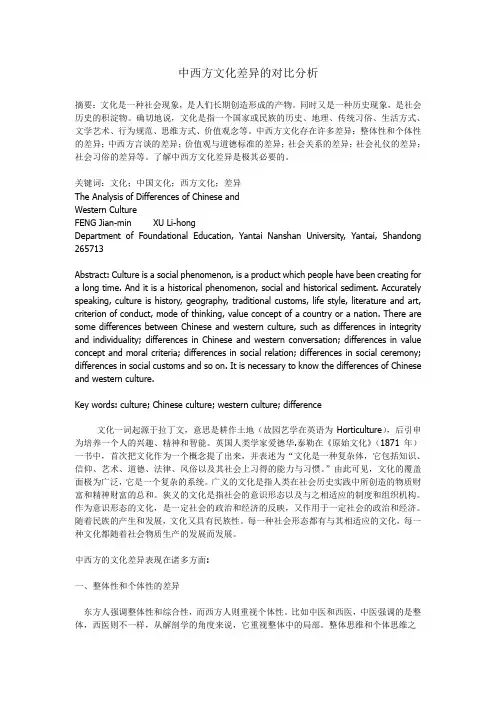
中西方文化差异的对比分析摘要:文化是一种社会现象,是人们长期创造形成的产物。
同时又是一种历史现象,是社会历史的积淀物。
确切地说,文化是指一个国家或民族的历史、地理、传统习俗、生活方式、文学艺术、行为规范、思维方式、价值观念等。
中西方文化存在许多差异:整体性和个体性的差异;中西方言谈的差异;价值观与道德标准的差异;社会关系的差异;社会礼仪的差异;社会习俗的差异等。
了解中西方文化差异是极其必要的。
关键词:文化;中国文化;西方文化;差异The Analysis of Differences of Chinese andWestern CultureFENG Jian-min XU Li-hongDepartment of Foundational Education, Yantai Nanshan University, Yantai, Shandong 265713Abstract: Culture is a social phenomenon, is a product which people have been creating for a long time. And it is a historical phenomenon, social and historical sediment. Accurately speaking, culture is history, geography, traditional customs, life style, literature and art, criterion of conduct, mode of thinking, value concept of a country or a nation. There are some differences between Chinese and western culture, such as differences in integrity and individuality; differences in Chinese and western conversation; differences in value concept and moral criteria; differences in social relation; differences in social ceremony; differences in social customs and so on. It is necessary to know the differences of Chinese and western culture.Key words: culture; Chinese culture; western culture; difference文化一词起源于拉丁文,意思是耕作土地(故园艺学在英语为Horticulture),后引申为培养一个人的兴趣、精神和智能。
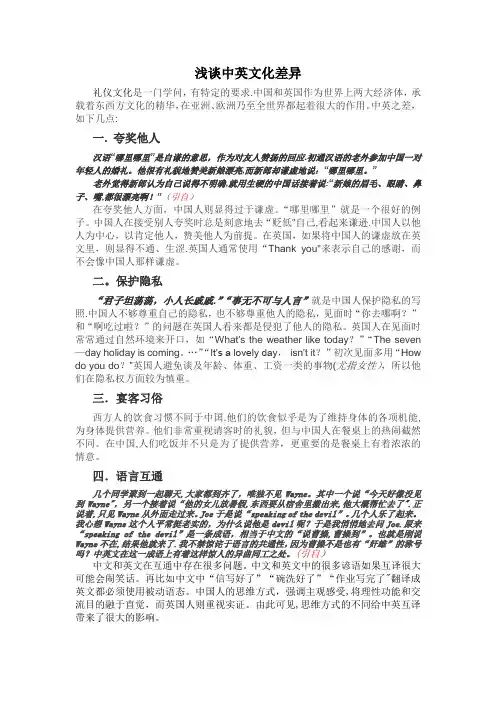
浅谈中英文化差异礼仪文化是一门学问,有特定的要求.中国和英国作为世界上两大经济体,承载着东西方文化的精华,在亚洲、欧洲乃至全世界都起着很大的作用。
中英之差,如下几点:一. 夸奖他人汉语“哪里哪里”是自谦的意思,作为对友人赞扬的回应.初通汉语的老外参加中国一对年轻人的婚礼。
他很有礼貌地赞美新娘漂亮,而新郎却谦虚地说:“哪里哪里。
”老外觉得新郎认为自己说得不明确,就用生硬的中国话接着说:“新娘的眉毛、眼睛、鼻子、嘴,都很漂亮啊!”(引自)在夸奖他人方面,中国人则显得过于谦虚。
“哪里哪里”就是一个很好的例子。
中国人在接受别人夸奖时总是刻意地去“贬低"自己,看起来谦逊.中国人以他人为中心,以肯定他人,赞美他人为前提。
在英国,如果将中国人的谦虚放在英文里,则显得不通、生涩.英国人通常使用“Thank you"来表示自己的感谢,而不会像中国人那样谦虚。
二。
保护隐私“君子坦荡荡,小人长戚戚.”“事无不可与人言”就是中国人保护隐私的写照.中国人不够尊重自己的隐私,也不够尊重他人的隐私,见面时“你去哪啊?”和“啊吃过啦?”的问题在英国人看来都是侵犯了他人的隐私。
英国人在见面时常常通过自然环境来开口,如“What’s the weather like today?”“The seven —day holiday is coming。
…”“It’s a lovely day,isn't it?”初次见面多用“How do you do?”英国人避免谈及年龄、体重、工资一类的事物(尤指女性),所以他们在隐私权方面较为慎重。
三.宴客习俗西方人的饮食习惯不同于中国.他们的饮食似乎是为了维持身体的各项机能,为身体提供营养。
他们非常重视请客时的礼貌,但与中国人在餐桌上的热闹截然不同。
在中国,人们吃饭并不只是为了提供营养,更重要的是餐桌上有着浓浓的情意。
四.语言互通几个同学聚到一起聊天,大家都到齐了,唯独不见Wayne。
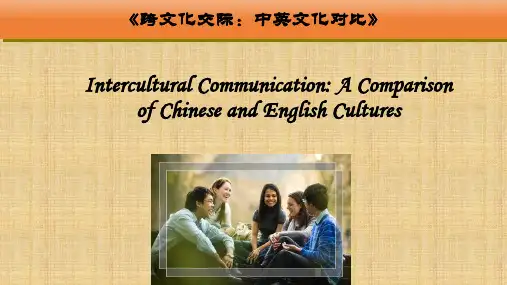
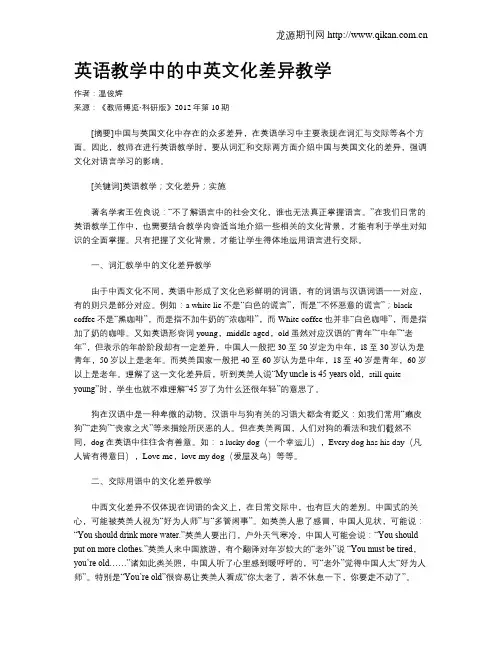
英语教学中的中英文化差异教学作者:温俊辉来源:《教师博览·科研版》2012年第10期[摘要]中国与英国文化中存在的众多差异,在英语学习中主要表现在词汇与交际等各个方面。
因此,教师在进行英语教学时,要从词汇和交际两方面介绍中国与英国文化的差异,强调文化对语言学习的影响。
[关键词]英语教学;文化差异;实施著名学者王佐良说:“不了解语言中的社会文化,谁也无法真正掌握语言。
”在我们日常的英语教学工作中,也需要结合教学内容适当地介绍一些相关的文化背景,才能有利于学生对知识的全面掌握。
只有把握了文化背景,才能让学生得体地运用语言进行交际。
一、词汇教学中的文化差异教学由于中西文化不同,英语中形成了文化色彩鲜明的词语,有的词语与汉语词语一一对应,有的则只是部分对应。
例如:a white lie不是“白色的谎言”,而是“不怀恶意的谎言”;black coffee不是“黑咖啡”,而是指不加牛奶的“浓咖啡”,而White coffee也并非“白色咖啡”,而是指加了奶的咖啡。
又如英语形容词young,middle-aged,old虽然对应汉语的“青年”“中年”“老年”,但表示的年龄阶段却有一定差异,中国人一般把30至50岁定为中年,l8至30岁认为是青年,50岁以上是老年。
而英美国家一般把40至60岁认为是中年,18至40岁是青年,60岁以上是老年。
理解了这一文化差异后,听到英美人说“My uncle is 45 years old,still quite young”时,学生也就不难理解“45岁了为什么还很年轻”的意思了。
狗在汉语中是一种卑微的动物。
汉语中与狗有关的习语大都含有贬义:如我们常用“癞皮狗”“走狗”“丧家之犬”等来描绘所厌恶的人。
但在英美两国,人们对狗的看法和我们截然不同,dog在英语中往往含有善意。
如: a lucky dog(一个幸运儿),Every dog has his day(凡人皆有得意日),Love me,love my dog(爱屋及乌)等等。
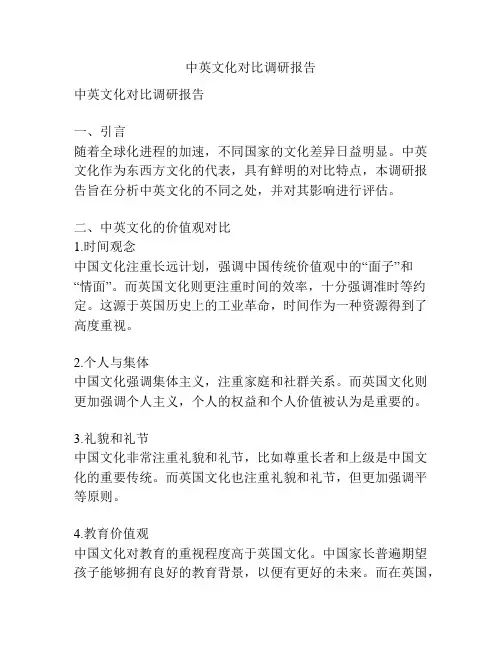
中英文化对比调研报告中英文化对比调研报告一、引言随着全球化进程的加速,不同国家的文化差异日益明显。
中英文化作为东西方文化的代表,具有鲜明的对比特点,本调研报告旨在分析中英文化的不同之处,并对其影响进行评估。
二、中英文化的价值观对比1.时间观念中国文化注重长远计划,强调中国传统价值观中的“面子”和“情面”。
而英国文化则更注重时间的效率,十分强调准时等约定。
这源于英国历史上的工业革命,时间作为一种资源得到了高度重视。
2.个人与集体中国文化强调集体主义,注重家庭和社群关系。
而英国文化则更加强调个人主义,个人的权益和个人价值被认为是重要的。
3.礼貌和礼节中国文化非常注重礼貌和礼节,比如尊重长者和上级是中国文化的重要传统。
而英国文化也注重礼貌和礼节,但更加强调平等原则。
4.教育价值观中国文化对教育的重视程度高于英国文化。
中国家长普遍期望孩子能够拥有良好的教育背景,以便有更好的未来。
而在英国,虽然教育也很重要,但社会对教育的期望相对较低。
三、中英文化对比的影响1.商务交流由于中英文化的差异,双方在商务交流中可能会出现误解和摩擦。
中方注重人情关系,英方则更注重合同和法律。
因此,在商务谈判中,双方需要更好地理解对方的文化差异,以避免不必要的冲突。
2.教育合作中英两国的教育合作具有相互借鉴的特点。
中国的高考制度注重记忆和应试技巧,而英国的教育则更注重培养学生的创造力和批判思维能力。
因此,两国在教育领域的合作可以互补双方的优势,提升教育质量。
3.旅游体验中英两国作为旅游目的地具有不同的吸引力。
中国的丰富历史和文化吸引了大量的英国游客,而英国的风景名胜和文化遗产则吸引了众多中国游客。
但由于文化差异,游客可能会遇到一些困惑和挑战。
相关的旅游服务和资源可以根据对方文化的特点进行调整和改进。
四、结论中英文化在时间观念、个人与集体、礼貌和礼节以及教育价值观等方面存在明显的差异。
这种差异会对双方的商务交流、教育合作和旅游体验产生影响。
英汉文化差异与习语翻译摘要:语言是文化的载体,语言教学在一定意义上是文化的教学。
中西两种文化存在着明显的差异,这种差异给文化交流构成了障碍,给英语教学造成了困难。
为使学生在交际过程中顺利地进行交流,英语教学中应重视中西文化差异问题。
习语是民族文化特征的结晶。
习语翻译绝不能只着眼于语言转换,而是透过语言的表层,了解其深层内涵和文化内涵,根据其语义理据或逻辑理据来推断其含义。
关键词:语言;文化;英汉对比;习语翻译语言作为文化的一部分,既是文化的载体和表现形式,又是文化传播和继承的重要手段。
使用不同语言的民族,由于其文化背景的不同,在漫长的演变过程中形成了不同的文化特色。
一种文化的特征总是表现在它的语言上,不同的语言蕴含着不同的民族文化心理和不同的文化特征。
习语较其它语言成分更具典型性。
习语是民间文学的语言宝库,是人们在长期的社会实践中千锤百炼出来的生动、精粹的语言,既是一个民族语言的精华,又能反映出民族的文化特征。
英汉两种语言都是高度发达的语言,都有着丰富的习语。
在内容上习语所选用的素材和民族历史背景、物质条件、风俗习惯息息相通;在形式上习语的表现手段、结构方式也都浸透着民族语言特征;在体现语言的文化特征方面,习语较之其他语言成分更具典型性。
一、文化差异对习语内涵的影响由于英汉民族的发展道路、生存环境各不相同,气候产物相异,进而影响各自的生存方式,而不同的生存方式产生了英汉民族不同的文化个性。
这些文化上的差异使得英汉民族在比喻事物时其联想就必然会有所不同,因此在长期的历史演变过程中所形成的习语,无论在语言形式上或在表达方式上都各有特色。
中国是农业大国,以农耕为重要生产方式,因而牛是汉民族十分熟悉而与之有着千丝万缕联系的家蓄,而英国的以游牧式的畜牧业农业生产特点,使得马又成为英国人十分熟悉而与之有着千丝万缕联系的家蓄,因此汉语中表示人体格健壮有“体壮如牛”,而英语中表示相同喻意的习语则为“as strong as a horse”;汉语中用“多如牛毛”形容事物众多,而英语中则说“a s plentiful as blackberries”,因为英国气候潮湿,黑莓是随处可见。
中西文化差异对比中国作为东方最大的发展中国家,传承着自古以来5000年的历史,在文化方面,也有着自己的特色。
与西方文化对比,存在着很大的不同之处。
下面就从几个主要的方面对中西的文化差异进行简要的对比。
一,价值观与道德标准的差异(Differences in V alueConcept and Moral Criteria)西方人崇拜个人奋斗,尤其为个人取得的成就自豪,他们从来不掩饰自己的自信心、荣誉感以及在获得成就后的狂喜。
相反,中国文化不主张炫耀个人荣誉,而是提倡谦虚。
在西方文化中,与" 自我" (self) 相关的观念可以说是根深蒂固、无所不在。
在英语中就有许多以自我为中心的词汇,如“self-absorption (自我专注)、self-admiration(自我赞赏)、self-cultivation (自我修养) 、self-image (自我形象) 等等。
故此西方社会盛行的是个体主义(individualism)”,强调个人自由、不受外来约束。
而中方文化强调集体利益高于个人利益,"先国家,后集体,再个人,先利民,再利已" 的话语随处可见。
通过简单的言语就可从中了解两种截然不同的文化。
二、风俗习惯1、称谓及称呼: 学习英语时,我们发现英语中的称谓名称比汉语中的要少得多。
例如,英语中cousin一词,对应于汉语的表兄、表弟、表姐和表妹等。
我们看到,汉语把表亲关系区分得非常严格,既要说出性别,又要分出大小,根本不像英语笼统一个词了事。
这种语言现象的产生归因于中国二、三千年之久的封建统治。
这种封建社会高度重视血缘关系,特别强调等级间的差异,提倡长幼、尊卑有序。
亲属关系亲疏,长幼和性别等万面不同,导致权力和义务也随着出现区别,故称谓区分得严格而细密。
英语中的称谓为数不多,除dad, mum, grandpa, aunt, uncle等几个称谓经常使用外,其它的几乎都不用。
中国和英国的饮食文化差异英语作文Differences in Chinese and British Food CultureFood culture plays a significant role in shaping a country's identity and heritage. Chinese and British food cultures are both rich in history and tradition, but they have significant differences that reflect the unique values and beliefs of each nation. In this essay, we will explore the differences between Chinese and British food cultures in terms of ingredients, cooking methods, dining habits, and social significance.Ingredients:Chinese cuisine is known for its wide variety of ingredients, including rice, noodles, vegetables, meats, seafood, and spices. Chinese people believe in the balance of flavors and the harmony of colors in their dishes. Traditional Chinese dishes often include a combination of ingredients with contrasting textures and flavors, such as sweet and sour, spicy and sweet, and crunchy and soft.On the other hand, British cuisine is characterized by the use of simple and hearty ingredients, such as potatoes, meat, fish, and vegetables. British people enjoy dishes that are savory and comforting, often featuring roasted meats, stews, and pies.British cuisine also incorporates ingredients from other cultures, such as Indian curry and Chinese stir-fries, reflecting the country's history of colonization and immigration.Cooking Methods:Chinese cooking methods are diverse and versatile, ranging from stir-frying, steaming, boiling, braising, and roasting. Chinese people believe in preserving the natural flavors of the ingredients and enhancing them with minimal seasoning.Stir-frying is a popular cooking method in Chinese cuisine, as it retains the freshness and crunchiness of the vegetables and meats.British cooking methods are more straightforward and focused on roasting, grilling, baking, and stewing. British dishes are often cooked slowly to develop rich flavors and tender textures. Roast beef with Yorkshire pudding, fish and chips, and shepherd's pie are classic British dishes that highlight the country's love for hearty and comforting foods.Dining Habits:In Chinese culture, dining is considered a communal and social activity that brings families and friends together. Chinese people enjoy sharing dishes family-style and using chopsticks toeat. Meals are often accompanied by rice or noodles, soup, and a variety of side dishes. Chinese people also believe in the importance of balance and harmony in their meals, incorporating a mix of flavors, colors, and textures.In British culture, dining is more individualistic, with each person ordering their own dish and eating it with a knife and fork. British people enjoy meals that are substantial and filling, often consisting of a main course, side dishes, and dessert. English breakfast, afternoon tea, and Sunday roast are traditional British meals that reflect the country's love for hearty and comforting foods.Social Significance:Food holds a special significance in both Chinese and British cultures, reflecting the values, beliefs, and traditions of each nation. In Chinese culture, food is seen as a symbol of prosperity, health, and happiness. Chinese people believe in the therapeutic properties of food and the importance of nourishing the body and soul. Chinese people also celebrate special occasions, such as Chinese New Year and weddings, with elaborate feasts and festive foods.In British culture, food is a way to connect with family and friends, celebrate special occasions, and express cultural identity.British people have a strong sense of culinary tradition and take pride in their regional specialties, such as Cornish pasties, haggis, and Cumberland sausage. British people also enjoy culinary traditions, such as afternoon tea, pub culture, and street food festivals, that reflect the country's diverse and multicultural society.In conclusion, Chinese and British food cultures are both diverse and rich in tradition, reflecting the values, beliefs, and traditions of each nation. While Chinese cuisine emphasizes balance and harmony in flavors and textures, British cuisine focuses on hearty and comforting dishes. Both food cultures have a special significance in their respective societies, serving as a way to connect with family and friends, celebrate special occasions, and express cultural identity. By exploring the differences between Chinese and British food cultures, we can gain a deeper appreciation of the unique culinary heritage of each nation.。
英汉互译中存在的中西文化差异(2)二、情感色彩中的文化差异在翻译中的处理英汉对基本颜色的分类差别不大。
汉语中有赤、橙、黄、绿、青、蓝、紫,英语中有red,white,black,green,各种颜色对于不同的民族而言,在视觉和心理上所引发的联想和象征意义也不尽相同,译者在翻译时应特别注意其中的差异。
在英汉语言中,红色red有时可以完全对应,有时却大相径庭:如:红旗red flag红糖brown sugar,红茶black tea等等。
green 在英语中可以表示“嫉妒、眼红”,如,green with envy是指“十分嫉妒”的意思。
汉语中表示十分嫉妒的“眼红”,应该译为green-eyed而不能译为red-eyed。
由于美元的纸币是绿色的,所以green 在美国也指代“钱财、钞票、有经济实力”等意义。
黄色yellow在英汉语言中的引申含义差别较大。
在英语中yellow可以表示“胆小、卑怯”的意思,例如:a yellow dog可鄙的人,ayellow livered胆小鬼。
汉语中黄色一词有象征低级趣味、色情庸俗的意思,如黄色电影、黄色书刊等等。
这些名称中的“黄”与英语中的“yellow”无关。
能够表示汉语中的意思的词应该是:pornographic色情的、vulgar庸俗下流的等。
然而,英语中另一个颜色词blue却常用来表示汉语中这类意思。
如:blue jokes下流的笑话,bluefilms黄色电影等。
蓝色blue 在汉语中的引申意义较少,而在英语中blue是一个含义十分丰富的颜色词。
英语的blue常用来喻指人的“情绪低落”、“心情沮丧”。
有时也用来指黄色的、下流的意思。
如:blue talk下流的言论、blue video黄色录像。
白色white在英汉语言中都有纯洁和清白的意思,但也有一些含义上的不同。
如:汉民族文化中,白色与葬事相联系,如:“红白喜事”中的“白”指葬事。
但在英语文化中,white表示幸福和纯洁。
英国文化与中国文化对比(英文)Western students enjoy a seemingly relaxed educational experience. This, however, is not the case for students in Asia, who face crushing workloads and are often very disciplined. In the first part of her Globalist.The decision is partly based on an inability — or unwillingness — to spend thousands of dollars in tuition fees, especially given the suspicion that local schools are better anyway. After all, what more could one want from a basic education than a strong grounding in language, math and science, all subjects in which Asian schools famously excel. Our main concern is the ability of our son — and indeed the whole family — to adapt to the strict diligence that is expected of the Chinese. Apprehension increases when talking to local friends.China has a long history of standardized tests, beginning with the ancient imperial exams initiated during the Sui Dynasty.Shelly Chen is at the top of the class at the Shanghai foreign language school, one of the city’s best middle schools. Already near fluent in English, she is studying German and ranks among the highest in hergrade in physics. Her goal is to get a full scholarship to Harvard to study biochemistry. It is not only Western expatriates that grow anxious when hearing about students like Shelly.Throughout England, politicians, parents and pundits worry that the industriousness and discipline of kids in the East are leaving relatively relaxed Westerners trailing behind. Though there is some debate surrounding the statistics, it is widely believed that North America is failing to produce sufficient graduates in sciences and engineering.Still less controversy attends the observation that math scores throughout the West rank well below those of most Asian countries. As a result, there is a deepening consensus that, in order to maintain its competitive edge,Chinese students are taught that all questions have but one right answer and there is little room for debate.North American education needs to move away from an emphasis on fun, flexibility and individual learning styles.Instead, it has to shift towards a more strict, disciplined teaching environment that math and science,in particular, seem to demand.This shift can be discerned even in Canada, where there are no college entrance exams, and where, standardized testing, memorization and rote learning have long been frowned upon.Nevertheless, there is a mounting chorus complaining that the prominence given to creativity cheats students out of a proper education.People like science teacher Sumitra Rajagopalan are entreating Canadian educators to adopt a more Asian pedagogical philosophy based on “constant repetition, recitation, grilling and drilling”. In the United States, the rise of China and India is putting even more emphasis on the demand for education reform.Tougher standards,New policies — such as No Child Left Behind — have led to an increased stress on standardized testing.In the 2006 State of the Union address, President George W. Bush mentioned the threat of Asia’s giants specifically when introducing his “Competitive Initiative”, a program that promises substantial funds for the teaching of basic math and science.But in an ironic twist, there is an increasing desire to make education more England in China. Many now agree that the lack of creativity in China’s education system will soon prove a major stumbling block in the country’s continuing development.Government and business leaders worry about a derivative, manufacturing-based economy, which is unable to innovate core technology, lacks major research and development projects — and lags far behind in creative sectors like marketing and design.A lack of flexibility and inability of individuals to take the initiative affects the entire service sector, paralyzing employees at every level. Arriving late for the set breakfast at a five-star hotel in Chengdu, for example, I, along with a group of other foreigners, found that the coffee had run out. Our request for more threw the staff into crisis.It was not until a series of meetings had been held and permission sought from senior management that a fresh pot could be brewed.Passing even trivial problemsup the management hierarchy in this way is simply impossible in a sophisticated post-industrial society.Chi na has implemented a set of reforms known as “quality education”.This policy, which aims to teach creativity and emphasize character development, has resulted in certain concrete shifts including changes to textbooks, an increased emphasis on oral skills in language learning —and various attempts to get teachers to encourage student participation.Most Chinese, however, are skeptical that anything other than surface transformation is taking place. As they are quick to point out, the underlying issue — an education system rooted in standardized tests — has yet to be altered.Chinese students achieve near perfect scores on Western standardized exams. But when go abroad, they find themselves ill prepared for the education.Today, national tests determine which elementary, high school and university a student will attend. They are stillthe single most important factor in deciding one’s general career path.The weight given to testing is regularly criticized throughout Chinese society. Newspapers and magazines commonly report on the extreme pressure of the general exams.Stories range from concern over the suicide rate to bizarre anecdotes like the one about girls in Guangdong province who are said to have bought up mass quantities of contraceptive pills and then taken them during the test period — in the hope of warding off the ill effects of their menstrual cycle.Despite these concerns, there is little real impetus for the testing system to change. In China, standardized tests are seen as the only way to guarantee meritocracy and ensure fairness. The Canadian method of granting university admission on the basis of interviews and grade point averages is seen as far too subjective.In China, many believe that in a system like this the best schools, universities and jobs would go only to those with the right guanxii (connections). China’s emphasis on memorization and rote learning has significantconsequences. Students are taught that all questions have but one right answer and there is little room for debate and original thought.Subjects like history and politics are focused solely on dates and names. Even the Chinese language exam, which requires students to write essays, allocates grades according to how well one can quote classical texts and idioms.Passing trivial problems up the management hierarchy is simply impossible in a sophisticated post-industrial society.As a result, Chinese students develop what appears to many Westerners as a shocking capacity for memorization. Many are able to recite entire articles and there are stories of some who are capable of committing the entire dictionary to memory.Chinese students thus regularly achieve near-perfect scores on the standardized exams of Europe and England. when they go abroad many of these students find they are ill-prepared for Western education. Chinese students with phenomenal TOEFL (Test of English as a ForeignLanguage) scores are often incapable of taking part in simple English conversation.At least one graduate school in one of England’s mo st elite universities has now become wary of accepting students from China for this reason.Assumed skills such as in-class participation, seminar presentations and individual research projects, common practice in elementary schools in North America, are largely unheard of in the Chinese classroom — even in most universities.National tests determine which school a student will attend. They are the most important factor in deciding one’s career path.Moreover, the stress on original thinking and strict rules regarding plagiarism often seem baffling to students from China. An American teacher working in Yunnan province tells of encountering this cultural divide when two students handed in the exact same essay for an in-class exam.Because of diffrent traditions and cultures,there are many diffrences between Chinese education and British education.Firstly,the Chinese education is "nine year compulsory education".Most of schools are public schools.And the tutions come from the government.And the British education is also compulsory education.But the school system is two-track system which included the public school and the private school.And the tutions are free in the public school while those come from the students' parents in the private school.Secondly,the Chinese schools only have some subjects,such as Chinese,maths,English,history,physics and so on.The Chinese students must study these subjects every day.And they must work hard that they hardly have spare time.But in Britain,the students have chances to choose an elective cource to expand their knowledge and visions.And they have much more spare time to play than Chinese students.精品资料Finally, the Chinese educational system is very simple.Most of students have to pass the college entrance examination.And then they can go to college to study a major.But in Britain, the students have many choices to study.There are many technology schools.Every body can enter without certisfication and limeted age.Although there are many differences between the Chinese educantion and the British education,they have some adventages and disadventages in some aspects.仅供学习与交流,如有侵权请联系网站删除谢谢11。